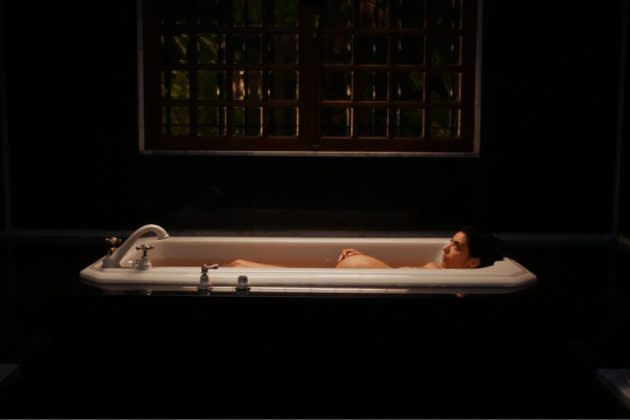‘Animalia’ Review: Aliens Invade the Art-house in an Impressively Atmospheric and Enigmatic Feature Debut
- Oops!Something went wrong.Please try again later.

A careful camera takes note of the placid symmetries of a gated house in a desert location. A fountain flows in the courtyard. A chandelier hangs in the hallway. Rococo chairs share plush rooms with Middle Eastern mosaics under elaborate wooden ceilings — a clash of aesthetic influences that signify wealth even above geography or culture. In the kitchen, Itto (an excellent Oumaïma Barid) — beautiful, young, heavily pregnant — chats cheerfully with the staff, relaxed and easy. Until, that is, her mother-in-law enters and a frosty hush settles. Director Sofia Alaoui sets up “Animalia” as an intimate dissection of the foibles and hypocrisies of Morocco’s moneyed classes. But Amine Bouhafa’s fine score, all ominous cello and somber bass, suggests that something more profound and destabilizing than the class divide is lying in wait, just beyond the hazy horizon.
Alaoui’s award-winning short film “So What If the Goats Die,” which was also gorgeously, woozily shot by DP Noé Bach, tracked a solitary goatherd trekking into town to buy animal feed on the day aliens arrive. “Animalia” is an expansion of that film, or perhaps more accurately, another tale from its shared universe. Here again, the otherworldly threat is nebulous and undefined, evoked by inexplicable meteorological phenomena and by its psycho-spiritual effect on the human population rather than by raygun-wielding extra-terrestrial invaders. But here, with Itto as her heroine, Alaoui, working from her own taut, confidently ambiguous script, also gets to comment on the position of women in Muslim societies and the limits of wealth and organized faith, as well as elegantly outlining the eerie experience that is suddenly finding yourself startlingly alone during a time of shared global panic. The pandemic resonances are hard to ignore.
More from Variety
Itto has “married up” from a poorer rural Berber background into the politically and economically powerful family of her husband Amine (Mehdi Debhi). She loves Amine and enjoys the luxuries of her new family’s lifestyle, but is quick to notice the snobby disdain of her tacitly disapproving mother-in-law, and chafes against the requirements of wifely perfection, when she’d rather veg out on one of the richly upholstered sofas watching videos on her phone and eating candy.
She’s doing exactly this (to the strains of “It’s Your Thing” — thankfully the only time the otherwise artfully allusive soundtrack lands so heavily on the nose) having made her excuses to get out of a household excursion to the city of Khourigba, when she first realizes she’s home alone while an unprecedented global event is occurring. Above the house across the vast desert skies, clouds filled with green lightning gather. Animals are behaving oddly, peculiar mists are descending, villages seethe with unease. Cellphones don’t always work, but during a rare connecting call, a frantic Amine arranges for a neighbor to bring his pregnant wife across the surrounding desert to Khourigba, where he and his family are enjoying relative safety behind police-guarded barricades.
But the neighbor abandons Itto at a small town where she is forced to take refuge in a hotel against the sometimes hostile, sometimes curious, sometimes blank, vaguely tripped-out, possibly alien-possessed stares of the idling menfolk. She is befriended first by a stray dog and then by Fouad (Fouad Oughaou), a fellow Berber (Itto’s code-switching between French, Arabic and Berber is a small essay in fish-out-of-water cultural survivalism in itself) who catches her in the act of trying to steal his delivery bike. Grudgingly, Fouad agrees to bring Itto to her husband, but not before she has developed (or perhaps remembered, from her repressed past) a resourcefulness she never displayed when surrounded by luxury. When the threads that bind you into the social fabric are broken, are you lost or are you free?
Beyond Itto’s tentative transformation, what a terse description of the film’s plot cannot quite convey is the gathering mood of dislocation and strangeness that spreads across the landscape of the film from scene to scene like a virus. Like the understated, gorgeously eerie moment when the dog, chasing after Itto as she drives off with Fouad, leaps into the air and snaps at a bird which then takes over the pursuit. It’s as though the dog’s intent, which it perhaps caught from the local man it bit earlier, has somehow been transferred onward again to the bird, a spreading chain of connection between living forms, that marks the shift into an overtly mystical register in the final third.
The shift, which includes Itto’s encounter with a young shepherd and her own eventual communion with the strange hypnosis-inducing fog, will frustrate those who like their science fiction to follow more dramatic, more definitive, less “we are all made of stars” logic. “I could tell you that everyone was changed,” says Itto’s voiceover over a montage of the characters reverting to their prior lives, implying they were not. But rare is the story that can comfortably be interpreted as both a planet-wide spiritual awakening and a farewell, and the mystical yet elegiac tone of this closing montage balances those impulses perfectly.
The recurring refrain of the “infected” humans is to say, with a curious half-smile “Everything will be all right” and here, the reassurance seems to stretch far, far into the future, beyond the time of people, perhaps, where life continues, but we do not, and that is no bad thing. Alaoui’s meditative, obscure but ultimately rather lovely “Animalia” imagines humankind getting a fleeting glimpse at the interconnectedness of all living things. But it’s a glimpse only granted to a species — such as ours — that is on its way out, as a parting gift.
Best of Variety
Sign up for Variety’s Newsletter. For the latest news, follow us on Facebook, Twitter, and Instagram.
